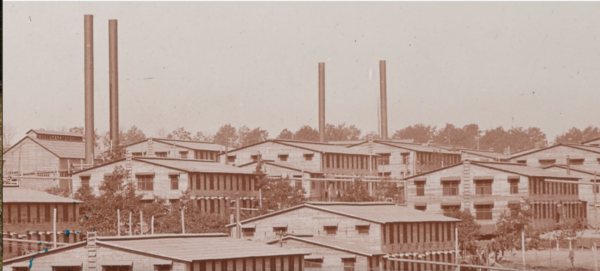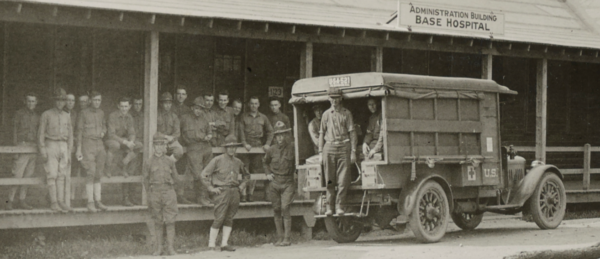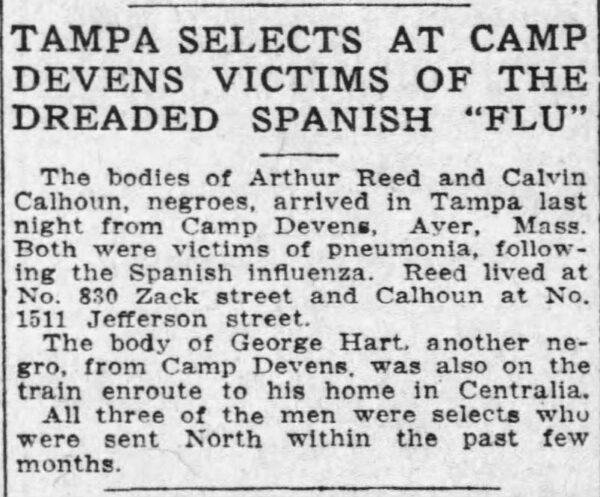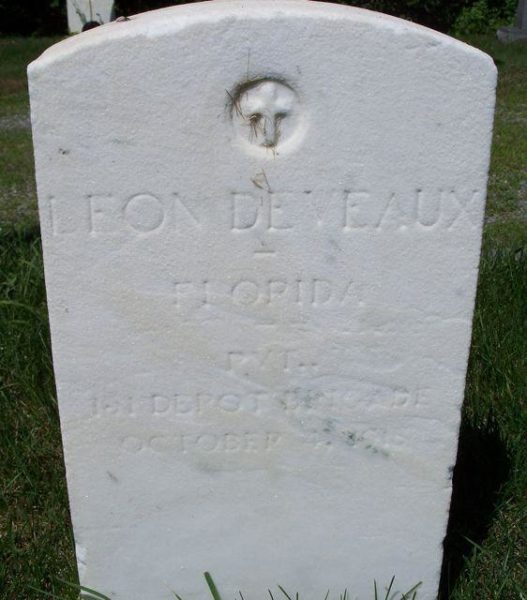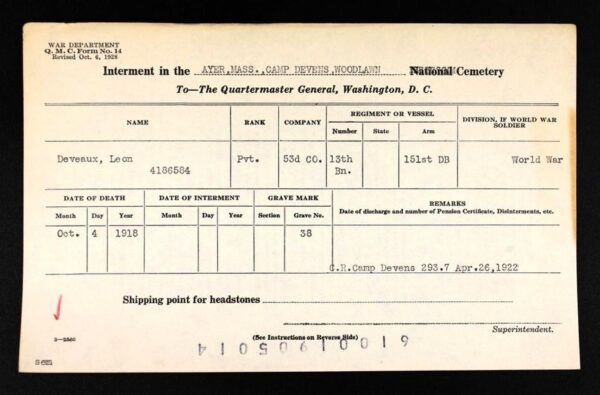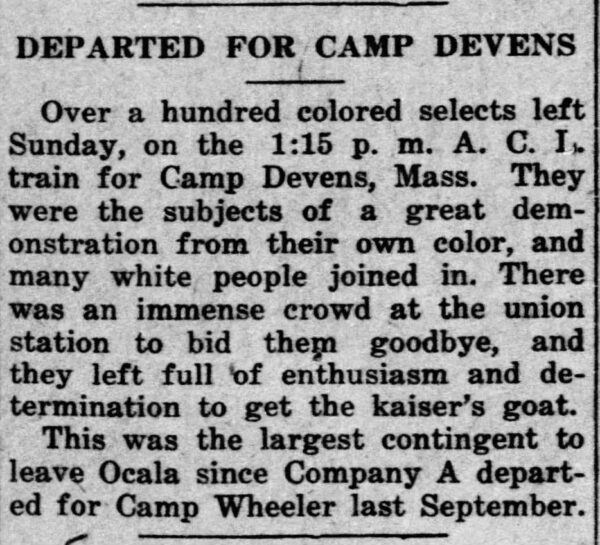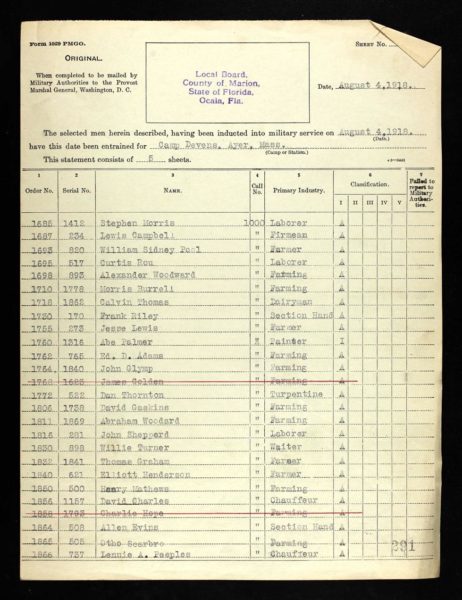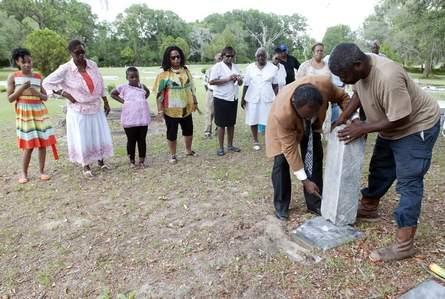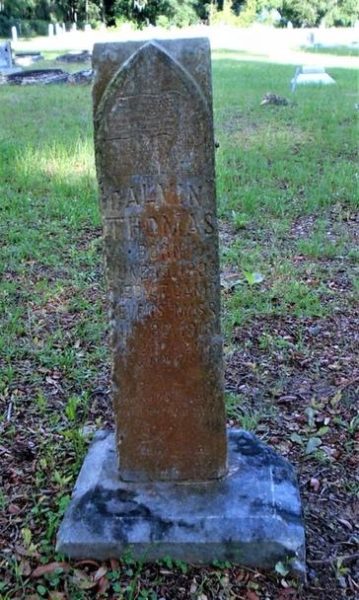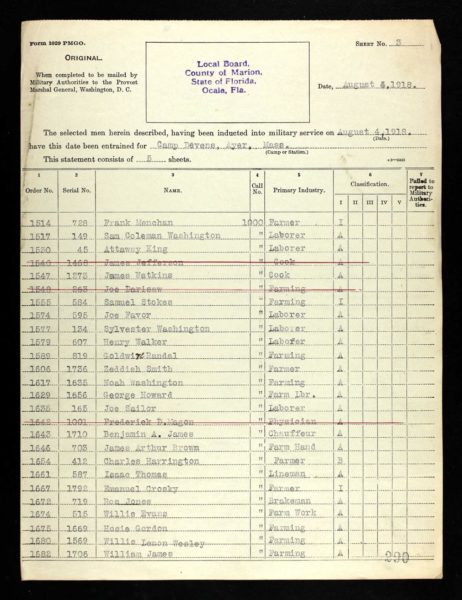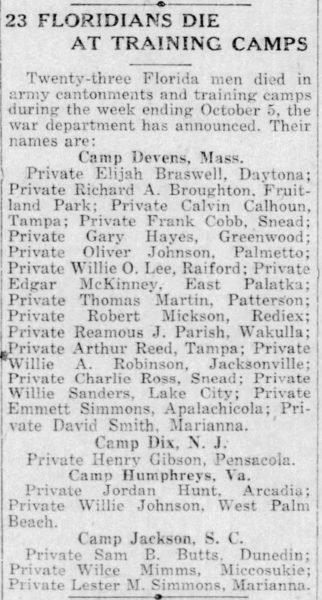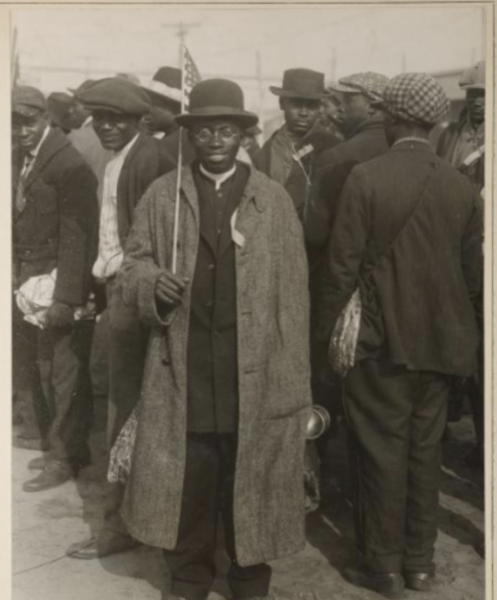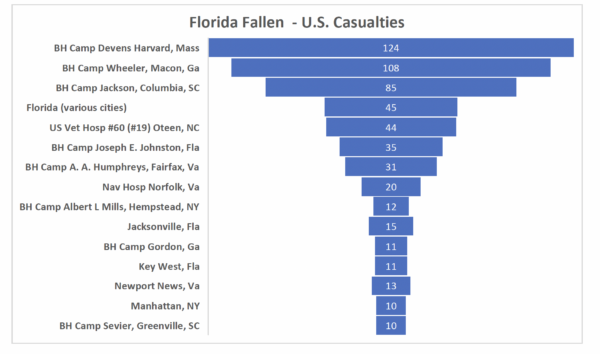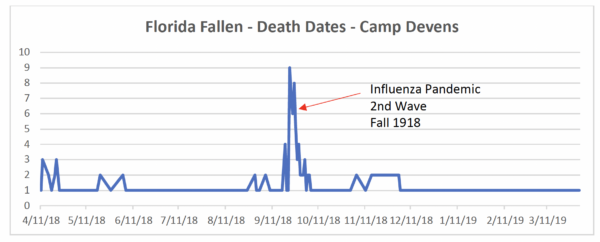Partial view of barracks at Camp Devens.
More of Florida’s Fallen died at Camp Devens than at any other place in the United States. Nearly three-quarters (72%) of the 124 known deaths occurred during the months of September through December 1918, an extremely lethal period. The cause of death for these men was overwhelmingly (97%) respiratory illness, attributed to the so-called “second wave” of the H1N1 virus pandemic that occurred in U.S. Army camps during Fall 1918.
Camp Devens was located near Ayer, some 35 miles northwest of Boston, Massachusetts. Like other cantonments (training centers) in the country, it was built quickly during the summer of 1917. Its medical staff was first-rate. But the camp was overcrowded. Designed to hold a maximum of thirty-six thousand, on September 6, 1918, Devens held nearly fifty thousand. At the time, the base hospital could accommodate 1,200 and it was caring for 84 patients. But it was not prepared for what happened next.
Base Hospital, Administration Building, Camp Devens.
Less than three weeks later, on September 22, almost 20% of the entire camp was on sick report, and almost 75 percent of those were hospitalized. In a single day, some 1,543 Camp Devens soldiers reported ill with influenza. There were more flu cases at Camp Devens than at all of the 24 other training centers combined. On September 26 the medical staff was so overwhelmed, with even doctors and nurses not only ill but dying, they decided to admit no more patients to the hospital. By the end of the month, Camp Devens averaged about 100 deaths per day.
The camp became a hellhole of death. Soldiers clutching blankets lined up outside the hospital in the rain while cots overflowed into hallways and onto porches. Doctors had to step over piles of corpses to watch an autopsy. The camp ran out of coffins. So, they had to stack up bodies like cordwood in the morgue. Doctors could do nothing to contain the disease. They desperately searched for a vaccine and treatments, but failed. They could do nothing but wait and hope. After more than two months, pandemic influenza began to subside. By mid-November, of the more than 14,000 at Camp Devens who had been infected with influenza, some 2,278 died, including five nurses and two doctors.
Training of African American troops at Camp Devens.
Arrival of African American recruits at Camp Devens.
Seventy-six of those who died at Camp Devens between September 17 and November 15, 1918, were Floridians. Most of these men had been in the Army for only a few months. They were inducted in early to mid-August 1918. All were privates, except for one, who held the rank of private first class, and he was the only white man as well. All the others were African Americans, who trained separately from white soldiers and lived in segregated barracks, per Army regulations.
The Army chose to train large numbers of black recruits along with whites at Camp Devens, while Camp Jackson in South Carolina was reserved for white draftees only. All of the Florida National Guardsmen stationed at Camp Wheeler were also exclusively white. In addition to being mostly African Americans, the Floridians were on average slightly more than 25 years old. Fifty-three of the 76 were Florida natives, largely from rural areas. The remainder were from Georgia, the Carolinas, Tennessee. Two were born in Nassau, Bahamas. Nearly all of the men were assigned to the 151st Depot Brigade, a temporary unit for new recruits, providing them with uniforms, equipment and initial military training.
Tampa Tribune 10/1/1918 p. 3
Among the dead were Arthur Reed and Calvin Calhoun. Both men were among a group of African American inductees Tampa sent to Devens. Born in Wilmington, North Carolina on May 5, 1892, Arthur Reed worked as a convict road maker at Christmas, Florida prior to being drafted. He was inducted on August 4, 1918, and served as private, 151st Depot Brigade at Camp Devens until his death by pneumonia on September 25. His body was returned to his mother, Narcessa Reed, and he was buried in Woodlawn Cemetery in Tampa.
In addition to Reed, there were 71 other deaths recorded at Camp Devens on September 25, seven of them Floridians, including Calvin Calhoun. Born in Ocala, Florida on July 27, 1894, Calhoun was a cooper employed by the Whitehouse Barrel Company in Hastings, Florida, prior to being drafted, also on August 4, 1918. He, too, was buried in Woodlawn Cemetery.
Miami Herald 8/5/1918 p. 2
Duty at Camp Devens was not an automatic death sentence. Of the 54 “Dade county boys” mentioned in the above article as having been ordered to Camp Devens in early August 1918, only two became victims of the influenza pandemic a few months later: Privates Leon Deveaux and Falcon Edgecomb, both natives of Nassau, Bahamas. Twenty-one years old, Edgecomb died on September 24, while Deveaux, four years older, died on October 4, 1918, and was buried in the camp cemetery.
Grave marker for Leon Deaveaux, who never made it home from Camp Devens.
Interment card for Leon Deveaux, who lies buried in the post cemetery.
Ocala Evening Star 8/5/1918 p. 1
Lists of Men Ordered to Report to Local Board for Military Duty, sent from Ocala, Florida to Camp Devens, August 4, 1918.
Among the 112 draftees ordered to report to the Marion County Courthouse in Ocala to entrain to Camp Devens, on August 4, were Calvin Thomas, dairyman, and Willie Turner, waiter. Thomas was born on June 15, 1893, in Santos, Florida, one of at least ten children of Starling Thomas (1860-1946) and Hattie Emma Kendrick (1870-1954). He died of pneumonia at Camp Devens on August 30, 1918, and was buried in the Burrell Cemetery in Santos, south of Ocala. Willie Turner was born on March 16, 1898, in Orange Lake, Florida. He died of pneumonia at Camp Devens on September 23, 1918, and was buried in Houston Cemetery in Orange Lake.
Descendants of Calvin Thomas repairing his tombstone at the Burrell Cemetery in 2013.
Other Ocala inductees on August 4, who later died at Camp Devens, were James Arthur Brown, a farmhand from Martel, Florida, born May 27, 1892, second oldest son of Thomas W. (1865) and Phyllis Brown. Private Brown died of influenza on September 28, 1918. William (Willie) Lenon Wesley, son of Clarkson Wesley, a Civil War veteran, 3rd USCT, from Pennsylvania, was born March 8, 1892, in Newberry, Florida, near Gainesville. Wesley died on September 22, 1918. And Robert Mickson, born July 7, 1893 in Fairfield, Florida, who died on September 27, 1918.
Miami Herald 10/18/1918 p. 2
Shelton Smith was among a large number of African American recruits from Florida who were transported by rail to Camp Devens for initial military training. Inducted at Live Oak, Suwanee County, on March 28, he arrived at Camp Devens on April 3, 1918. A native of Volusia County, born on October 6, 1886, Smith remained at Camp Devens until April 28, when he was ordered to Camp Humphries, Virginia. He served in Co A 521st Engineer Service Battalion overseas from August 30, 1918 to June 23, 1919. Private First Class Smith was discharged from the Army on June 27, 1919.

